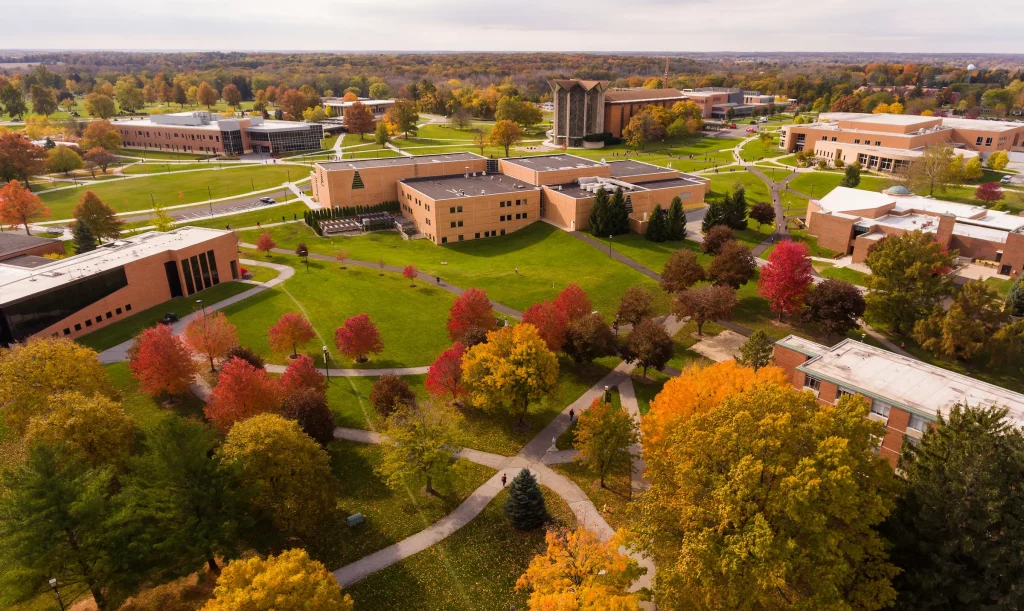Valparaiso University Contributes to NAC&U Publication Aiming to Increase Student Learning by Restructuring Faculty Workloads, Assessments
Teagle-funded project examines holistic departments; updated faculty evaluation process
Faculty from Valparaiso University contributed to “Redefining the Paradigm: Faculty Models to Support Student Learning” — a monograph that encourages colleges and universities to more effectively structure departments to address changes in higher education and better support student learning.
During the past two years, Joseph A. Bognar, chair and associate professor of music, Elizabeth A. Burow-Flak, chair and associate professor of English, Richard A. Gillman, associate provost for faculty affairs and professor of mathematics and statistics, Peter E. Johnson, chair and associate professor of mechanical engineering, and Aaron M. Preston, chair and associate professor of philosophy, worked with colleagues throughout the New American Colleges and Universities (NAC&U) consortium on this Teagle Foundation-funded project to study and make recommendations on holistic departments and faculty evaluation methods.
“Colleges and universities haven’t really changed the way departments are structured and the way faculty are evaluated despite major shifts in pedagogy and faculty responsibilities over the past few decades,” said the monograph’s co-editor David Salomon, professor of English and director of undergraduate research at The Sage Colleges. “We need to move away from viewing professors as the ‘sage on the stage’ and instead focus on the various activities — inside and outside of the classroom — that they do to foster student learning and advance the institutional mission.”
In the monograph, NAC&U outlines a new way of organizing departments and programs as “holistic departments” and recommends a new process for faculty evaluation called “the learning-centered paradigm.” Traditionally faculty have been evaluated on scholarship, teaching, and service, but this monograph addresses the reality that faculty are engaged in many activities that cannot be easily separated into those categories. Instead, it argues for a holistic view of a department’s collective workload and seeks to achieve fluid, equitable workloads that can change as the department’s and faculty members’ needs change.
The authors call for a holistic view of faculty assessment as outcomes and successes can be demonstrated in many areas, rather than simply scholarship, teaching, and service, such as mentoring undergraduate researchers, facilitating learning communities and coordinating experiential learning opportunities including internships and civic engagement projects. The monograph promotes the idea of students as active learners, working collaboratively with faculty doing research, service projects or other experiential learning.
“NAC&U was a good candidate to adopt this project because our member campuses already have an integrated view of higher education,” said Nancy Hensel, president of The New American Colleges and Universities. “In fact, some campuses were already examining these issues which allowed us to include real-world examples in the monograph.”
“Redefining the Paradigm: Faculty Models to Support Student Learning,” edited by Nancy Hensel, Lynn Hunnicutt and David Salomon, is available on the NAC&U website at www.newamericancolleges.org. The Holistic Department Committee included representatives from Arcadia University, Belmont University, Hamline University, Pacific Lutheran University, The Sage Colleges, University of Evansville, Valparaiso University, Westminster College, and Widener University. The Faculty Evaluation Committee included representatives from Belmont University, Hamline University, The Sage Colleges, University of Evansville, Wagner College, Westminster College, and Widener University. Working to support and strengthen liberal arts education, The Teagle Foundation supports projects to improve student learning in the arts and sciences.
